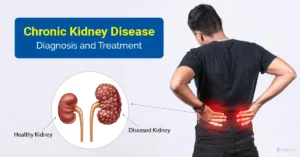
The kidney’s primary job is to filter out waste from our body in the form of urine. This regular functioning keeps our body fresh and clean. However, Chronic Kidney Disorders (CKD) can hamper kidney functions and result in urine accumulation in the body.
The prevalence of a sedentary lifestyle, prolonged work hours, and the increasing prevalence of unhealthy habits has led to a rise in lifestyle diseases such as Chronic Kidney Disease (CKD) among the population. Defined as an irreversible disease with no specific curative treatment, CKD is the 12th leading cause of death worldwide and approximately impacts close to 10% of the general population. The condition often leads to permanent damage and scarring of the kidneys and due to lack of awareness and knowledge, most patients suffering from the condition are often unaware until the late stages of the disease.
Several underlying factors such as Diabetes, Hypertension and Obesity, are the key contributors to chronic kidney disease. Chronic Kidney Disorders develop over some time and are not a sudden occurrence. The kidneys lose their function slowly and this is often detected quite late. This is why we must keep an eye on various symptoms of kidney problems.
Symptoms of Chronic Kidney Disease:
- Feel more tired and have less energy
- Have trouble concentrating
- Have a poor appetite
- Have trouble sleeping or muscle cramps at night
- Have puffiness around your eyes
- Have swollen feet and ankles
- Have dry and itchy skin
- Have to pass urine more often, particularly at night
Kidney disease symptoms are often non-specific and quite general. This means that these symptoms might be a cause of other illnesses as well. This is why acting immediately on kidney disease symptoms is critical.
Diagnosis of Chronic Kidney Disease:
People suffering from diabetes and high blood pressure can also develop several kidney ailments. In addition to this, individuals who smoke and consume alcohol frequently are also at high risk of kidney malfunctioning. Our lifestyle habits, diet, and physical activity can also be determining factors in this aspect. This is why people falling in the above categories must undergo regular health checkups to determine the health of their kidneys.
Physical diagnosis of kidney disease is usually the first step in understanding the situation. Usually, kidney ailments result in an accumulation of fluids in our body and the doctor may use the stethoscope to check for any fluids deposited in the lungs or heart. This physical examination often provides doctors with vital clinical information.
Your blood and urine are one of the most critical indicators of your kidney’s condition. As mentioned earlier, several kidney ailments result in the collection of electrolytes and blood tests are an accurate way of understanding the level of accumulation. Urine tests are also a vital determinant of kidney problems. Our urine is supposed to have certain traces of protein. However, in the case of kidney diseases, the traces of protein are abnormally high. Apart from this, blood and urine tests are conducted to determine the following:
- The presence of Albumin in urine with an Albumin to Creatine Ratio urine test.
- Measuring Creatinine levels in the blood, as it’s a waste product.
- Glomerular Filtration Rate (GFR) to measure your level of kidney function and determine the stage of the kidney disease.
Your doctor may also perform a CT to get a clear picture of the kidneys and urinary tract. This also lets them know the likelihood of facing a kidney stone or tumor. Further diagnosis may include a biopsy of the kidney or observing the kidney tissue under a microscope. In severe
How can you prevent yourself from Chronic Kidney Disease:
Constantly Monitor Your Sugar Levels
If you are suffering from diabetes, then you must consult your physician regularly. It is recommended that such patients must also monitor their sugar levels and should keep their HbA1c value below 7.
It is a common misconception that the medicines taken for diabetes are the primary cause of the development of kidney diseases among diabetic patients, however, this is just a myth as our kidneys get damaged due to uncontrolled sugar levels. Therefore, diabetic patients need to optimize their diet, exercise, and anti-diabetic medications with the help of a physician to prevent kidney damage.
Check Blood Pressure if you are Hypertensive
Hypertensive patients must regularly monitor their blood pressure and must keep their blood pressure value below 140/90 or 130/80 mm Hg to be precise. Such patients must also reduce their salt intake and should regularly follow up with their doctor to keep a tab on their health and adjust to the medications.
Avoid Over the Counter Medications
Self-medication often leads to more harm than cure. With the advent of technology, information related to several medicines and diseases is available at the convenience of one ‘tap’ and instead of getting themselves examined by a medical practitioner, several people are now resorting to the web for any health-related issues. This has led to a rise in Over Counter Medications, especially painkillers (Diclofenac, Aceclofenac, Ibuprofen, Nimesulide, Mefenemic acid, and Naproxen) that are often taken without any prior consultation and result in kidney damage among several patients.
Adopt healthy practices to Avoid CKD
People can also follow these healthy practices to reduce their risk of CKD
- Drink plenty of fluids, at least 2 to 3 litres of water per day.
- Adopt a healthy diet and consume food rich in fibre, low in fat, whole grains, nuts, seeds, poultry, fish, fruits and vegetables.
- Exercise regularly with moderate intensity for a healthy heart and kidneys. 30 minutes of daily physical activities like brisk walking, cycling, and swimming for at least 5 days in a week (150 minutes/week) is recommended for overall well-being. People can also consider strengthening and stretching exercises for two days a week for a healthier routine.
- Quit smoking: Smoking causes damage to the blood vessels which can affect the heart and kidneys. Therefore, It is very important to quit smoking.
- Weight reduction: Obesity is an independent risk factor for the development of kidney disease. Hence, one must monitor their Body Mass Index (BMI) regularly should consult a dietician and consider a diet for weight reduction and do regular exercise if their BMI exceeds the optimum range. (Please mention)
- Regular health check-up: If you have risk factors like diabetes, hypertension, or a family history of kidney disease, it is advisable to have your kidneys screened every year. Simple investigations like urine routine and blood creatinine levels will give you an insight of kidney health. In selected individuals, an ultrasound abdomen would be required. It is advisable to have an annual health check-up if you are above 40 years of age.
- Children with recurrent urinary tract infections need special attention. Boys especially need detailed evaluation to know the cause of urinary tract infections and to receive appropriate treatment so that kidney damage is prevented.
Chronic Kidney Disease Treatment:
Chronic kidney diseases don’t have a specific treatment. However, using the appropriate medication can reduce the pace of their deterioration. In many cases, kidney problems are related to high blood pressure and medicines controlling the blood pressure may also be recommended by doctors. Since kidney swelling (Hydronephrosis) is a result of urine accumulation, doctors may also put the patients on diuretics which can make a person pass urine frequently.
Chronic kidney diseases can also result in low calcium levels and lesser bone density. To counter this, doctors also recommend calcium and Vitamin D supplements.
Dialysis is another common form of kidney ailments treatment followed the world over. This is only done in extreme cases where the patient’s kidneys are totally out of function.
There are two primary kinds of dialysis: hemodialysis and peritoneal dialysis. In hemodialysis, blood is filtered outside of your body, in a machine. And in the case of peritoneal dialysis, a special solution is injected into your abdominal cavity which absorbs excess fluids and waste before they are removed from your body. Because dialysis is usually performed regularly, it is a big lifestyle change and also carries a risk of infection.

